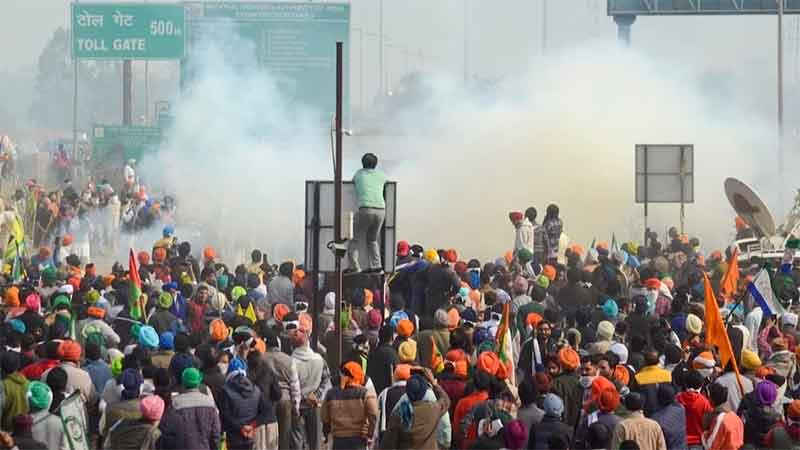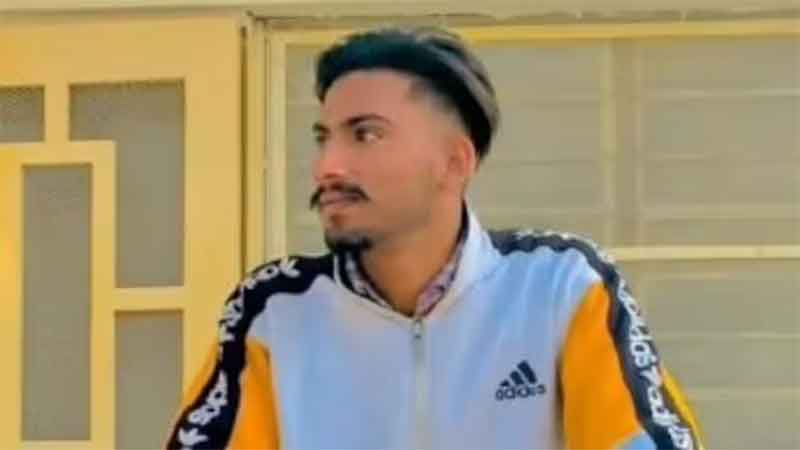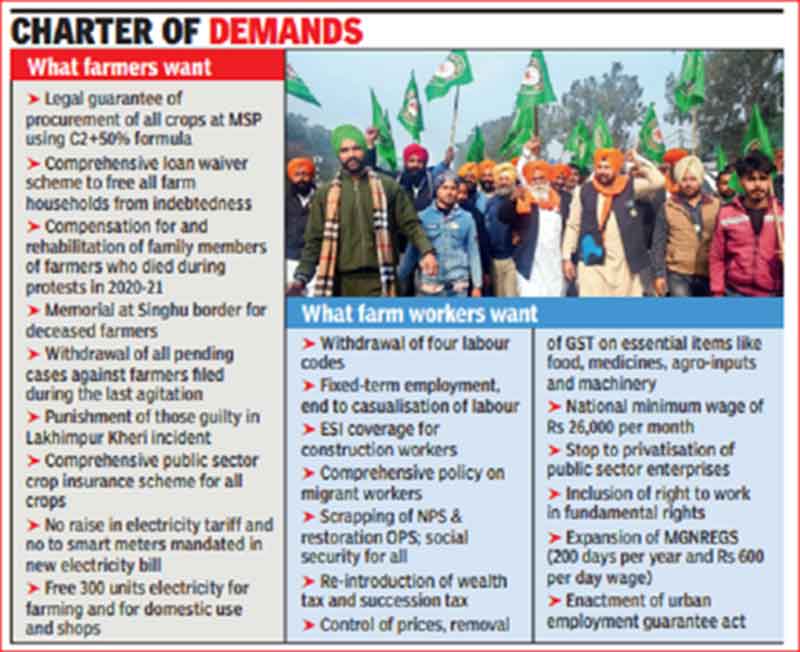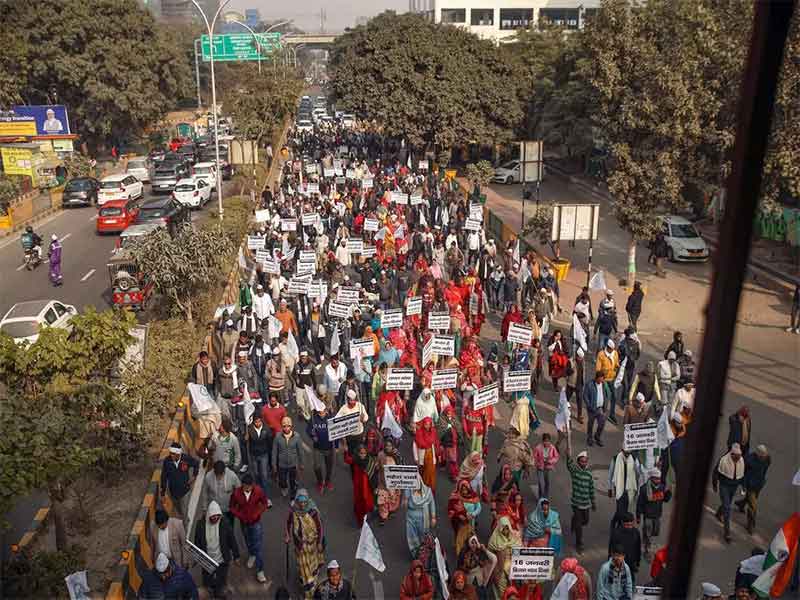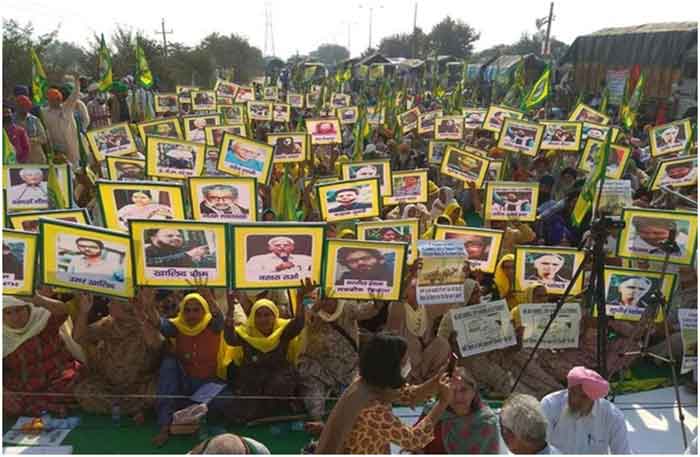
I simply do not have an adjective in the dictionary to sum up the intensity of the farmers resistance in Delhi. History continues to be re-written like an inextinguishable light. It is reminiscent of a protracted war launched by an army against unflinching odds, confronting the enemy in the very belly. Each and every day it is further consolidating. With the methodology and skill of an architect or surgeon and relentlessness of a boulder resisting a thunderstorm the farmers organisations have braved it out on the outskirts of the capital. Never in the nation’s history have the rulers been embarrassed to the very core as here. What was positive was the unity of varying trends like the BKU factions of Ugrahan Rakewal Dakaunda or Kirti Kisan Union, tightening the noose on the ruling classes. Re-inforcements are launched by the hour .Never has an agitation in India evoked the support of farmers from sp many regions or other sections like workers, employees and students. One gets the vibrations on every successive day or a new chapter of an epic novel. It is heartening to witness how everyday the intensity of the struggle is electrifying with contributions from all sections of the democratic revolutionary camp This very minute I am writing this report a contingent of women belonging to families of suicide victims are marching in to the outskirts of Delhi in Tokri area , to reveal their grim economic plight and a semi-conference is being staged.
On December 10th the BKU(Ugrahan) organised a most impactful programme condemning the arrest of the intellectuals and attacking the very base of social fascism. In the whole nation we do not witness programmes qualitatively of this kind on this issue. With great authority and conviction Joginder Singh Ugrahan refuted the allegations of the agitation been influenced or infiltrated by Maoists and emphasises it’s mass democratic character. There wa s a most notable participations by the Tarksheel Society which in gross depth summarised the powerful fascist tendencies prevailing. With great depth of analysis it narrated the connection between the designs of proto-fascist regime and the course of th peasant agitation .With great precision it explained how demanding release of such people framed is an integral part of the Indian people’s struggle for establishing democratic rule.
A most notable feature in recent days is how in regions of Tikri in Delhi continuous guarding, patrolling or vigil is undertaken for 24 hours by the BKU(Ugrahan) with cadre swapping different duties.
In a most positive interview Surkh Leeh editor Pavel Kussa highlighted the unity of various section s which were rooted in the revolutionary secular tradition. Another significant development is the acute contradiction in the ruling classes with even Congress and SAD leaders like Badal demanding scrapping of the agricultural bills, with a vociferous voice. In Pavel’s view the road to solving the problems of the agricultural crisis would determine the direction or path of the agitation. In his view irrespective of quantitative impact what was most crucial was the placing of the economic and political demands in coherence with the current socio-political order. Only the long term solution of the agrarian crisis would determine the political fate. His other point was how different social forces wished to influence the agitation like Federal rights, Khalistanis, rich peasant organisations etc.Pavel also touched upon how the issue should not be inclined towards sectarian interests or only partial demands but as a component of apolitical movement as a whole. Basically he placed emphasis on the political direction of solving the crisis.
On a day to day basis most inspiring interviews have been undertaken by BKU(Ugrahan) president Joginder Singh Ugrahan. Repeatedly with the spirit of a soldier he has thwarted any attempts to compromise the demands of the agitation and has in the very core refuted the attempts of the rulers to twist the struggle by hoodwinking the people. With the sharpness of as word he combated any acceptance of the farmers of the amendments of the BJP Govt.Very inspiring interviews also took place of Ugrahan women leader Harinder Bindu,who projected the unity of women landed peasantry and dalit agricultural labour. Rarely have women ever in peasant agitation shimmered the spark of resistance with such intensity. Whatever differences the voice of Kirti Kisan Union president Rajinder Singh has also been a revelation .
The Bandh organised on 8th December was a thorn in the flesh for the ruling BJP,striking them in the very heart. What was most significant was the involvement of the industrial workers. Still it is the BKU(Ugrahan) which is morally contributing the most to sharpening the class polarisation or political angle to enable the peasantry to demarcate from the nefarious pro-imperialist ruling class politics
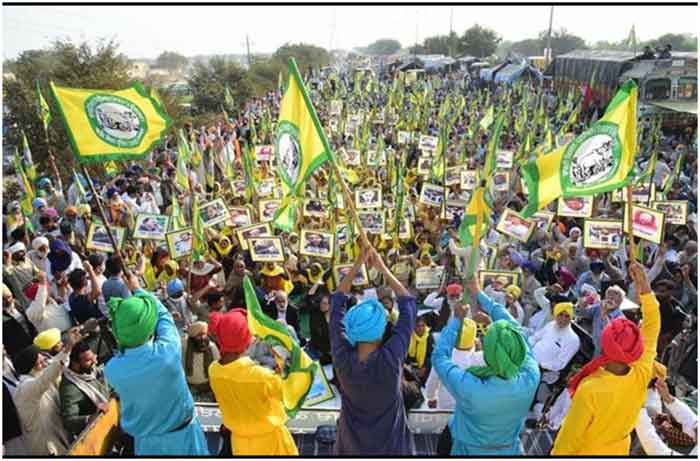
A revolutionary farmers platform is being crystallized with a nucleus being knitted to counter proto fascism and uniting all possible sections. Great solidarity programmes have been undertaken in Punjab for the Delhi farmers, resembling the flow of an Ocean. The leaders and activists must be saluted for continuing the temp by shimmering spark of liberation amidst the heaviest police enforcements. The neo-fascist nature of the Modi govt has been exposed at the very roots. The most impactful action sin support has been staged in Amritsar and Moga districts. With the insight of an architect a series of programmes were chalked out at district level in Punjab to intensify the spark of revolt.
One of the greatest achievements is how the bandh and overall movement has galvanised or aroused every sphere of society be it farmers, labourers, students, youth, industrial workers or govt.employees. as never before. In view of Sanjeev Mintu who is president of the Krantikari Pendu Mazdoor Union it has had an electrifying effect on the youth who are swayed by lure of drugs,to join the ranks of the agitation. With firm conviction he feels it has laid the roots to build a very strong anti-fascist base.
Another significant factor is the great support from people of foreign countries like Canada,Australia,England or America.Every other day on gets reports of solidarity protests. This connects the Delhi agitation with the impending global crisis.
One tendency that has to be guarded against is to classify the uprising with Sikh militancy, which would communalise it. The movement should not be deterred on the grounds of sections which wish to project it as a federal movement confronting autocracy of the centre which is in consonance with Regionalism. The nefarious designs of parties like the Congress,Aam Admi party and Akali Dal must be exposed to prevent the masses from being diverted from the essence of revolutionary class struggle.
A Qualitative contribution has also been given by the Krantikari Pendu Mazdoor Union led by Lakhveer Longowal with its leaders and activists integrating with the base of the movement.
With remarkable consistency the Punjab Students Union and Naujwan Bharat Sabha are fluttering the flag of resistance to inspire students and youth. Even if its numbers are not so large qualitatively the Kirti Kisan Union is influencing the Delhi protests .
Some very inspiring solidarity action has been undertaken by the Bhagat Singh Chatra Morcha in Uttar Pradesh which staged street corner protests with other democratic forces. It highlighted the fascist dictates of the Modi govt being a precursor of the agitation and it’s roots ingrained in the semi-feudal agrarian structure.
A very positive feature is also the tacit support by ex servicemen in army .singers and actors.
A powerful voice has also been raised by civil liberties groups and activists like Association for Democratic Rights in Punjab,Civil Liberties Commitee of both Telengana and Andhra Pradesh, and Peoples Union for Democratic Rights in Delhi.
A negative trend had errupted when three organisations independently approached the rulers for talks after being invited for negotiations. The BKU(Ugarhan) was critical of this approach.
Another grievance of organisations was the staging of the human rights programme on December 10th by the BKU(Ugrahan) which 31 organisations felt was not in harmony with the situation and violated the collective spirit. Buta Singh Burgill of BKU(Dakaunda) vociferously spoke against it as well as Rajinder of Kirti Kisan Union. They all insisted that only economic demands should be addressed from this platform and such a protest organised by Ugrahan derailed the movement. I differ diametrically with this view completely endorsing action of Ugrahan group.It was a virtual need of the hour to connect the agitation with that of proto-fascism in light of it being branded as ‘Maoist.’ Fostering a sporting spirit BKU Ugrahan secretary stated that organizationally they would not reply to the criticism.
Whatever differences it is vital that the basic unity of the democratic revolutionary forces must not be broken. It would resemble tearing fabric needed to stitch address.
The Bandh on December 8th may have been the most intense and qualitatively impact one ever in post-independence India infiltrating every walk of life engulfing virtually the whole nation. There was a tendency of domination of Northern states with less participation from Southern regions.
It is still of great importance that the people do not place faith in opposition of left parties who in essence endorse the autocratic social order offering no democratic alternative. To me it is virtual hypocrisy of the Congress,Akali Dal or even left parties to offer any sort of an alternative. It is important that the class demands of the peasantry are linked to the repressive socio-economic order as a whole and to the proto-fascist nature of India’s so called parliamentary or neo-liberal democracy. The broadest united front must be formed and ruling class contradictions utilised. However the agitators must beware of tailing behind opportunist forces who would diffuse the essence of the struggle.
What is missing is the leadership of a centralised Revolutionary party or a sustained agrarian revolutionary movement in the villages to sufficiently weld such an agitation into mass political movement. Ruling class politics and revisionism must be countered at the very roots and a democratic alternative properly projected. However Communists must be vary of not converting the united forum into a party platform and strictly adhere to the level of the people’s political consciousness.
The support by middle sections like teachers, doctors, engineers and journalists was tremendous. It is of vital importance to win or integrate such forces into the agitation
What is of vital importance is that the landless dalit agricultural labourers must be firmly entrenched in this agitation and Industrial workers mobilised interconnecting how the issues of agricultural bills landed peasantry affected them. Even the peasantry should be able to connect their economic demands with political ones to prevent tendency of economism.It should be linked with the political resistance against the nefarious HIndutva fascism and nation chauvinism. People should be educated how such agricultural bills are an integral part or manifestations of n0-liberal globalisation. There have been experiences in the past where major peasant movement have tailed behind the rich peasantry and derailed the struggle. What is of vital importance is that a united front is not broken with even traders or small businessman having acute contradictions with the govt policies .A balance should be maintained between the Punjab farmers movement with the movement of Indian farmers as a whole.
A most inspiring feature has been the confidence and determination expressed by the leaders and activists who with unflinching determination are fighting undeterred.
Even if I assess Punjab and India to be semi-feudal I propose that leaders analyse the impact of imperialism and capitalism on agriculture and semi-feudalism in light of the tyranny of Corporates or MNC’s..A strategy has to be devised to confront the seizure of lands by the Corporates incorporating struggle against commission agents. The subtle changes incorporated within the semi-feudal structure itself have to be further studied.
I grossly wish that the ‘Surkh Leeh ‘ journal would print a Hindi and English translation of their special issue which would do ample justice to the credentials of the agitation ,placing it in a correct Communist revolutionary or democratic light.
DHARNAS IN SUPPORT OF AGITATION(Tribune news)
On 15th December Hundreds of farmers turned up outside the offices of deputy commissioners in all districts of Punjab to participate in dharnas in support of the farmers protesting at the borders of Delhi against the three farm laws.
The call to hold dharnas was given by the 32 farmer unions who are jointly spearheading the protest. The protesting farmers in all offices issued a warning to the Centre to withdraw the three contentious farm laws and the amendments to the Electricity Act, or more farmers from the state would join the “pucca morcha” at the borders of the national capital. At Fatehgarh Sahib, the revenue patwaris and kanungos too joined the farmers in their protest. Jagmohan Singh Patiala, general secretary of BKU, Dakaunda, said students, traders, litterateur and government employees across the state had joined their protest.
“People raised their voice in unison, demanding that the government immediately repeal the three farm laws. The government offer for amendments is not acceptable to Punjabis,” he said.
In Gurdaspur, thousands of farmers, including a sizeable number of women and children, staged protests at the offices of the Deputy Commissioner and Batala Subdivisional Magistrate.
The police had a difficult time in controlling the surging crowds and alternative arrangements had to be made to ensure that traffic flowed smoothly. Gurdaspur SSP Rajinder Singh Sohal and his team of officers remained ensconced at the site.
In Batala, DSP (City) Parvinder Kaur was tasked to ensure no untoward incident happened in or around the SDM office. The farmers, who had started arriving at the DC office as early as 7 am, protested peacefully.
A massive protest in support of the ongoing agitation against the contentious farm laws was held outside the Deputy Commissioner’s office here on Monday. The protest was supported by many organisations and government employees of different departments.
Different organisations of the Health Department such as the Sanitary Inspectors’ Association, Medical Laboratory Technicians’ Association, Clerical Association, Punjab State Pharmacy Officers’ Association and ANM Union observed a one-day mass hunger strike in support of the farmers.
Employees of the Agriculture, Horticulture, Soil Conservation and Animal Husbandry Departments also organised a protest in support of the farmers. Sukhbir Singh Sandhu of the Agricultural Technocrats’ Action Committee of the agriculture and allied departments demanded that the farmers’ demands should be accepted without any further delay.
Meanwhile, the protest held outside the Deputy Commissioner’s office (under the banner of 31 farmer associations) witnessed participation from different sections of society. Though a large number of farmers are already in Delhi, the involvement of people belonging to other sections of society boosted the morale of farmers’ leaders.
Rattan Singh Randhawa, a farmer leader, said, “The farmers’ protest against farm laws is receiving a tremendous support from different sections of society. We are thankful to all the people for their support.” He said the response to the farmers’ agitation was tremendous.
The farmers’ leaders said the present dispensation at the Centre was not only working for the benefit of the corporate sector but was also trying to destroy the peace and communal harmony of people. They said the agitating farmers would not accept anything less than repealing of the three laws and a constitutional guarantee of the MSP.
They said agriculture was the backbone of the economy. The agitation was also addressed by Balwinder Dudala, Harjit Singh, Amarjit Asal, Gurnam Singh Daud, Jagtar Singh Karampura and others.
Representatives of different sections of society expressing their solidarity with the agitating farmers on Monday came out on roads and condemned the Union Government for not repealing the farm laws.
A large number of workers of different political parties, farmers, labourers, employees, patwaris, kanungos and daily wage workers organised a demonstration in front of the District Administrative Complex (DAC) in favour of the agitating farmers. Congress party workers sat on a hunger strike in front of the local MC building.
Meanwhile, a delegation of the Kisan Mazdoor Sangharsh Committee, Punjab, submitted a memorandum to the Deputy Commissioner.
The protest was attended by workers of the CPI, the RMPI, workers of different farmer organisations, teachers, patwaris, kanungos, Accredited Social Health Activist (ASHA) workers, Anganwari Employees, etc. Mangat Ram Pasla, national secretary of the RMPI, Harbhajan Singh, state leader of the CPI, Daljit Singh Dialpur, Arsal Singh Sandhu, Sarabjit Singh Sandhu of the Patwar Union were among others who addressed the gathering.
Sandeep Agnihotri, a senior leader of the Congress, led the party workers who sat on a hunger strike in support of the agitating farmers. Ritik Arora, district president of the NSUI, Aman Sood, Sawinder Singh Mallhi, Sonu Dode and other leaders condemned the Narendra Modi-led Central Government for its dictatorial attitude.
A delegation of the Kisan Mazdoor Sangharsh Committee, Punjab, led by Satnam Singh Manochahal submitted a memorandum to the DC demanding the scrapping of the farm laws.
PROTEST OF FAMILIES OF DECEASED FARMERS (Tribune news service)
Many families of deceased indebted farmers who have committed suicide are gearing up to go to New Delhi to participate in the December 16 protest against farm laws.These families, along with members of BKU Ugrahan, on Monday protested in front of Sangrur DC office and demanded the immediate rollback of farm laws.
“Our family has one-and-a-half acres and it is the only source of our livelihood. My husband committed suicide in 2018 after he failed to repay Rs 8 lakh. My 17-year-old son is the only earning hand. After the implementation of the black laws, we will not get MSP and it will multiply our problems,” said Amrit Kaur, a protester.
Another widow Jagir Kaur said that her family owns 4 acres, but after the suicide of her elder son and husband, her younger son is only male member in the family. “Presently, we sell our paddy and wheat on MSP. But when MSP won’t be there, how will we recover our input cost? We are going to New Delhi tomorrow and I will come back only after the rollback of the black laws,” she said.
Amid the din of sloganeering and speeches from the rostrum, with speaker after speaker targeting Prime Minister Narendra Modi for allegedly trying to corporatise agriculture, anxiety is palpable among the protesting farmers as they look for a political alternative to safeguard their interests.
Do we require “our own” political outfit to stop the exploitation of farmers? If the minimum support price on wheat and rice goes, will the prices of irrigated farmland fall further? Do our farmer leaders have political vision? Such thought-provoking queries trouble the young and the elderly alike as the protesters withdraw to their base camps after the day’s hectic schedule. The questions also reflect their disenchantment with the mainstream political parties — be it the BJP, Shiromani Akali Dal, Congress or the Aam Aadmi Party.
With no politician welcome on the “protest stage”, farmer union leaders, including Joginder Singh Ugrahan, Sukhdev Singh Kokrikalan, Jagmohan Singh Dakaunda and Balbir Singh Rajewal, have turned icons at the ‘kisan andolan’here. They have been grabbing space on the social media as well as the digital, print and visual media platforms.
As the youth share their concerns with their “new leaders” over the three central farm laws, Bharatiya Kisan Union (Rajewal) chief Balbir Singh Rajewal tells them it could be a long haul.
The anger and anguish against the political system is writ large on the faces of the protesters. Gurpreet, representing a group of progressive farmers from Ghanaur in Patiala, takes on the powers-that-be over their “double standards”.
“We are aware the underground water table is declining sharply due to traditional crops and there is overuse of pesticides, but the successive governments lacked in efforts to wean the farmers away from wheat and paddy. The attempts to promote diversification were half-hearted!” he maintains.
“All of them (politicians) stand exposed. The political outfits are concerned only about their own survival amid the changed dynamics,” says Parminder Singh of Chakdana village in Nawanshahr.
Otherwise owing allegiance to different political parties, the youngsters at the protest site here no more feel proud of being identified as “Congressi” or “Akali”. “We are farmers and are united here by a common cause,” says Raju from Aulakh village in Gurdaspur.
BHARAT BANDH IMPACT (from Tribune news service and C.P.I. (M.L-New Democracy)
Getting widespread support from all sections of society, the Bharat bandh called by farm organisations in protest against the BJP-led NDA government’s three farm laws saw a complete shutdown in Punjab today.
The entire state echoed with the sentiments of farmers and a clarion call to repeal the laws as people in large numbers came on roads carrying placards ‘no farmer, no food’ to express solidarity with farmers who have been observing a peaceful protest at the Delhi borders.
The attendance in government offices was thin as over 50,000 state government employees were on a one-day mass leave in support of farmers. Dharnas organised at block levels at 60 locations by different farmer unions saw large gatherings.
In Patiala, the protesters blocked the main roads and highways. Residents sat on dharnas at various places while Youth Congress workers burnt an effigy of Prime Minister Narendra Modi at Fountain Chowk in Patiala.
Around 2,000 engineers wore black badges and participated in protest rallies across the state in support of the farmers’ agitation and the proposed Electricity Amendment Bill-2020. The PSEB Engineers’ Association, a body of power engineers in Punjab, also supported the struggle of farmers.
The teaching faculty members and students of Punjabi University, Patiala, came together in solidarity with farmers against the Centre. Around 300 in number, they closed the entry gates of the university and held a protest.
Dr Nishan Singh Deol, president, Punjabi University Teachers’ Association, Patiala, said all businessmen, students, farmers and people of other professions had come together against the farm laws.
The Patiala District Bar Association also led a march in support of bandh call of the farmers. Jatinderpal Singh Ghumaan of the association said the Centre should find a solution to the concerns raised by farmers. “We will provide all legal help to farmers wherever required,” Ghumaan said.
Health workers under the banner of the NHM Employees’ Union, Punjab, also burnt the effigy of the Prime Minister. Employees of the Pepsu Road Transport Corporation (PRTC) also participated in the Bharat bandh and staged a protest outside the PRTC bus stand.
Bathinda and Mansa witnessed a complete shutdown in support of the bandh call given by farmers.
Tension erupted in the morning during the farmers’ protest at Kanhaiya Chowk in Bathinda when protesters damaged the windscreen of a private car of an Army man. He was going to Bikaner, but as farmers had given the call of a bandh, they were not ready to allow him go further. Later, senior farmer union leaders allowed passage to the car.
The supply of essential commodities was hit badly in these areas. Fruit and vegetable markets remained closed in all the cities and towns of the Malwa belt. The supply of milk was partially affected in many areas.
Farmers blocked and staged protests at various points in Bathinda district. They blocked the Bathinda-Amritsar national highway at Kanhaiya Chowk and near a toll plaza in Jeeda village. In Moga, the farm unions staged protests at 13 locations. The continuous protest outside the silo owned by a corporate giant in Dagru village also continued on the 62nd day today. The petroleum dealers also closed the filling stations to back the call for the nationwide strike. Darshan Singh Maiserkhana and Mothu Singh Kotra of the BKU (Ekta Ugrahan) said the Central Government brought the farm laws in haste without consulting the farm organisations. Shops and commercial establishments remained closed in Ferozepur, Fazilka, Ropar, Faridkot, Muktsar and other districts as well.
More than 90 percent of public life came to a standstill in Telangana, Andhra Pradesh, Tamil Nadu, Odisha, Punjab and West Bengal while the Bandh was widely observed in a total of 22 states including in Maharastra, Bihar, Tripura, Kerala etc. Most states saw massive outpouring of people in rallies and dharnas since early morning and these also included Madhya Pradesh, Uttarakhand, Assam, Himachal Pradesh, Rajasthan, UP, Haryana and others. In major cities, markets, rural markets, tribal areas, people came out in large numbers. Major mandis including the Azadpur mandi in Delhi and several in Uttar Pradesh was closed.Those who rallied included fishermen, adivasis, stone quarry workers, sand mine workers, daily wagers, share croppers, tenant farmers and a large spectrum of industrial workers, tempo and other transport workers, students and intellectuals. More than 1000 district and tehsil Bar Associations have observed a strike in support of the farmers.
A notable feature has been the active support from people of Delhi who came out in large numbers in all industrial areas and at least a 100 other places where huge rallies in support were taken out.
State Govts of Gujarat, Uttar Pradesh and Haryana unleashed massive repression and made hundreds of preventive arrests as well as during protests. Still several parts of these states saw people coming out and voicing their support to the farmers. Gujarat Govt has even issued a gag order over social media posts. AIKSCC condemns these undemocratic steps, cautions these Govts that voice of people cannot be muffled by barbaric and illegal use of state power and demands immediate release of all persons detained.
AIKSCC has severely condemned PM Modi’s attempts to defend the pro-corporate laws as establishing a new system, which in fact is a new system for direct Corporate control over input prices, crop purchase, marketing and take-over of farmers’ land. It is being driven by Modi Govt to allow the Corporate including MNCs, International Food Giants, Grain Trading Giants, World Food Processing Industry and Retail trading and online MNCs go gain control over the food market and enslave the people of India.
BKU(UGRAHAN) POLICIES COMBATING ALL OPPORTUNISM OF RULERS IN POWER
The state president Joginder Singh Urahan announced that family members of farmers who committed suicide from all over Punjab will be participating in a protest on the Tikri border on December 16 and the country will reveal the true nature of Punjab’s agriculture crisis to the world. The brutal reality of families of farmers who have lost their lives due to debt will be revealed to the world and how these new agriculture laws will multiply suicides by mounting further debts. On December 13th in the morcha, hundreds of rational activists under the leadership of Tarksheel Society from inside Punjab participated and supported the struggle. Addressing on behalf of the society, state leader Rajinder Bhador lit a spark to connect the agitation with all spheres of socity and govt autocracy.. He said that the strong support of all the leading constituencies of Punjab will make this movement compulsory to victory. He offered hundreds of advanced books to people in the struggle by the Tarksheel Society, said the society was distributing seven lakh books among the people in Delhi Morchas which would bring a new consciousness. Surinder Kumari Kochhar, who reached Desh Bhagat Memorial Hall from Jalandhar, expressed such feelings towards this struggle.. Also, today’s gatherings were addressed by Santveer Poonia of Haryana Farmer Unity and Tek Chand Sirsa, five-member Farmer Sangharsh Committee Punjab’s Daler Singh Rajoke and Hardeep Singh Jora. Today’s gatherings were also held by the leaders of the organization Shri Shingara Singh Mann, Paramjit Kaur, Harinder Kaur Bindu, Jaswinder Singh Longowal, Amarjit Singh Saidoke, Manjit Singh Nyal, Gurpreet Kaur Bryas.
BKU (Ekta-Ugrahan) has totally rejected the proposal sent by the central government and think that the proposal reeks of the anti-people approach of the Modi government. On the one hand, people from all over India are supporting the farmers but the government is putting all efforts to serve the corporates. BKU (Ekta-Ugrahan)’s president Joginder Singh Ugrahan said that the proposal has nothing new and it has just put in writing whatever had been discussed in the meeting with the central agriculture minister. He said that despite all the resentment in the country, the central government continues to strongly advocate the farm laws in the very introduction of its proposal. The proposal states that these laws will make farmers prosperous and then proposes the amendments in order to clear the apprehensions. The proposal endorses its pro-corporate agenda, wants to break the monopoly of APMC Markets and suggests that farmers should sell their produce in the open market. These proposed amendments will not change the thrust of central laws.
The proposed amendments authorises state government to give the right to register private mandis to the states. It creates provision for farmers to approach the civil court in case of failure to reach a solution in the reconciliation board of SDM in cases of disputes between trader and the farmer. The proposal promises written assurance about the MSP but it neither mentions Minimum Support Price (MSP) on all the crops nor about all the states. It does not make MSP a legal right of the farmer not does it link the MSP to the Public Distribution System (PDS). The proposal does not take back any of the concessions given to the traders and hoarders in the new laws. Some of the proposals are repetitions of verbal assurances that there is no danger to the lands of the farmers. Couple of proposed amendments are mere technicalities or otherwise insignificant.
The proposed amendment don’t say anything about the Electricity Bill (Amendment)-2020 and it is mere assurance that the present system of billing will be continued and as it is privatization will remain unhindered.
The union leaders said that the discussion on these proposed amendments is meaningless as this futile exercise has happened multiple times. These proposed amendments make it obvious that the government is adamant to handover the agriculture produce market to the corporates. These insignificant proposed amendments are just lip service to pacify the strong opposition to the farm laws.
The leaders stated that farmers can’t be taken for a ride and their demands remain- repeal the five laws, make MSP on all the crops for all the states as a constitutional right and universal PDS as a legal right. The protest will continue till these demands are met. They warned that the government can’t succeed in its attempt to divide the agitation as unity remains its strength.
The leaders added that the call to intensify the agitation has got very good response from all over the country. Farmers’ Unions from all over the country are united on the issue. Yesterday hundreds of thousands of farmers participated in making the call for Bharat Bandh successful. People from other walks of life joined the farmers on the street and the mobilisation is increasing with every passing day. Ugrahan said they will continue the protest in Punjab and in Delhi.
It is worth mentioning that a big contingent of Democratic Teachers’ Front (DTF) participated in seven rallies
HUMAN RIGHTS DAY PROGRAMME
Celebrated International Human Rights Day – Reached the democratic constituency too.
New Delhi 10 December —— Today also in the farmer’s front in Delhi. Who is the one. U. International Human Rights Day celebrated by Unity (Ugraha) dedicated to jailed intellectuals and democratic rights activists. A huge gathering in Baba Banda Singh Bahadur Nagar, who was settled near Tikri border, demanded Modi government to release the postpone workers from jail immediately. Addressing a big rally with pictures of arrested activists, Joginder Singh Ugraha, the organization’s state president, Joginder Singh Ugrahan, said that today’s day is to provide the rights of human living, fighting for the betterment of life and to maintain the glory of humanity. This is the day of Ahid. Today farmers are celebrating this day fighting for their rights. He said that the Modi government has crushed all dissent to the last dust by branding democratic intellectuals and activists as conspirators. made an axe of suppression on the country’s renowned intellectuals and democratic rights activists and false cases are being put in jail. Writers, artists who pen the people’s voice are mercilessly put down.It is imperative to defend the right for people to express their views. On this occasion, a famous activist of the democratic rights movement and social science professor Nandani Sundar addressing the jail post activists. Nandani Sundar filed a petition against the Salwa Judam started in Chhattisgarh in 2007 Prof. Mahavir Narwal, father of Natasha Narwal, leader of the cage breaking campaign, addressed his daughter’s democratic right to struggle. Vimal Bhai, the leader of the National Alliance of People’s Movement also projected his views. Dr. Gursharan Singh’s daughter, the activist of the democratic movement and famous playwright. Navsharan demanded that all black laws including UPA should be abolished on the democratic right of people’s struggle.
Punjab Loksabhya charak Manch State President Amolak Singh raised the need to strengthen the relationship between public struggles and literary people. In today’s unity, renowned Punjabi drama director Kewal Dhaliwal supported the farmer’s struggle and the actors of his organization Manch Rang Manch presented the opera of Joginder Baharle ′′ Harhian Saunian ′′ in a kisan way
UNITED PROTEST OF PEOPLE FROM DIFFERENT WALKS OF LIFE(From Sukhdev Singh Khokri Kalan-General secretary of BKU-Ugrahan)
On 14th December Many ex-servicemen, youth, artists, writers and many personalities associated with the film industry joined hands with Bhartiya Kisan Union (Ekta-Ugrahan) in their demand to repeal the agricultural laws along with other demands at Tikri Border in Delhi. The farmers, labourers and women involved in the agitation were encouraged by the presence of these celebrities. Addressing the gatherings at various places, union’s president, Joginder Singh Ugrahan announced that this massive and peaceful struggle of the farmers would finally force the Modi government to withdraw these black laws. He said that the families of the aggrieved farmers and labourers who had committed suicide due to deepening of the agricultural crisis resulting from the policies of globalization adopted by the governments of the country would reach the front on December 16 and will recount the stories of their pain.
Eminent playwriter Sahib Singh staged a play “Rangkarmi Da Bacha” and last night, he staged “Samman Wali Dang”. Apart from this, the team of eminent Punjabi singers – Kanwar Grewal and Harf Cheema performed their inspirational songs and Jagtar Zanjeer of Punjabi Sahitya Sabha Barnala spoke about the inseparable relationship between the people and the writers.
Addressing the gathering Capt. Gurjinder Singh Sidhu, president of Sainik Wing Punjab, Kulwinder Singh Rori of Naujwan Bharat Sabha Lalkar said that this struggle has now turned into a struggle of all the people which is a beacon of light for the people of the country and it can’t be buried under their false propaganda. The leader of five member Kisan Sangharsh Committee, Sukhwant Singh, BKU (Ekta-Ugrahan)’s leader Harinder Kaur Bindu and Paramjit Kaur Pitho, peasant leader from Haryana, Baljit Singh and Joginder Singh also addressed the gathering.
Addressing the gathering, the State Secretary of the union Shingara Singh Mann said that despite the misleading propaganda of the Modi government to showcase the peasant struggle being hijacked by the Khalistanis and Naxalites, the arrival of artists, entertainers and writers apart from large convoys of farmers was a manifest response to government’s false propaganda. He said that the team of eminent theatre artist, Harkesh Chaudhary reached the front and staged “Uttan Da Vela” (the time to rise). Punjabi film actors Malkit Rauni and Nirmal Rishi were also present on the occasion.
Harsh Thakor is a political commentator [email protected]
SIGN UP FOR COUNTERCURRENTS DAILY NEWSLETTER

